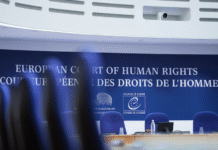Defendants in Turkey’s ongoing “girls’ trial” described the lasting emotional, psychological and personal toll of facing terrorism charges over routine religious and educational activities allegedly linked to the faith-based Gülen movement as the İstanbul 24th High Criminal Court adjourned Friday’s hearing without reaching a verdict, Turkish Minute reported.
According to observers who spoke to Turkish Minute on the condition anonymity, the hearing was marked by the absence of both the presiding judge and another regular member of the three-person panel of judges. In their place, two substitute judges oversaw the proceedings, while the main prosecutor was present. Legal observers and defense teams raised concerns about the court’s composition, calling the absences irregular and suggesting they may not be coincidental.
Most defense lawyers refused to present their final arguments, citing the absence of the presiding judge and arguing that proceeding without the full panel undermines judicial continuity. They requested a continuance, which the court granted. The next hearings have been scheduled for September 18 and 19.
The trial involves women and girls, including high school students, accused of terrorism due to their alleged affiliation with the Gülen movement. The charges are based on activities such as Quran study, tutoring, attending social gatherings and living in shared apartments. Many of the accused were detained in May 2024 during early morning police raids.
Several defendants who chose to speak on Friday detailed how the case has affected their daily lives and mental health. One said she now suffers from a phobia of social interaction, fearing that any new acquaintance might later be labeled a criminal. Another described the pain of putting her plans for motherhood on hold due to the uncertainty of the ongoing proceedings. Others simply asked for acquittal, stating that the charges stem from everyday acts like praying, studying or teaching English to children.
Three defendants refused to testify entirely in the absence of the presiding judge and asked for their statements to be postponed. Others who did speak noted that the accusations against them are based solely on social and educational gatherings — including bowling, iftar dinners and religious study sessions — and emphasized that no credible evidence had been presented throughout the trial.
The court also heard from those who had previously cooperated with the prosecution under pressure. They, too, requested acquittal, stating that the accusations are baseless and center on constitutionally protected behavior.
Observers noted that the prosecutor’s final opinion, delivered at the previous session on June 27, requested prison sentences of between six and 15 years for all 41 defendants. The opinion was not read in full but summarized briefly — a move that has drawn criticism from rights groups and legal experts.
The trial continues to attract international attention. Rights monitors from European and US-based organizations attended the hearing and have previously raised alarms over what they describe as the criminalization of normal religious and social life in Turkey.
The September hearings are expected to include final arguments from the defense. A verdict is likely in the following months.















